Fat & Bones (8 page)
Authors: Larissa Theule

“Tell that to the sprouts.”
Tulip leaned back until her head touched the ground, then sprung forward and walloped Daisy with all her might.
It was like being pounded by a hammer. Daisy hit the dirt hard, her petals crushed and oozing fluid.
Tulip fared better, only two red petals suffered minor tears. “Now you're bald,” she said. “How about that.”
She retrained her attention on the sprouts, who continued yammering away.
“Shut up!” she shouted. She fired the deadly pollen again and again, her long stem pulsing with every release. Blown to bits, the sprouts formed a bright green streak on the dark earth.
Tulip surveyed the scene. “Well,” she huffed, “That about does it. Simpler than I thought it'd be, really.”
Lying on the ground, Daisy whispered, “Oh, Tulip, what have you become?”
Daisy hurt all over. She felt naked and ashamed. How had it come to this?
The wheat around the puddle shook softly in the wind, strand after strand rustling, growing. Then the strands of wheat began to fall, stepped on, stomped on.
Close by, Daisy heard Tulip's tired panting and the confused thoughts rolling around deep inside her.
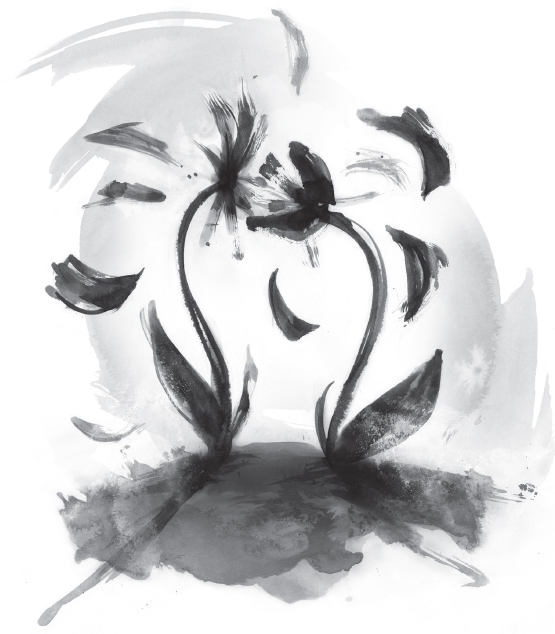
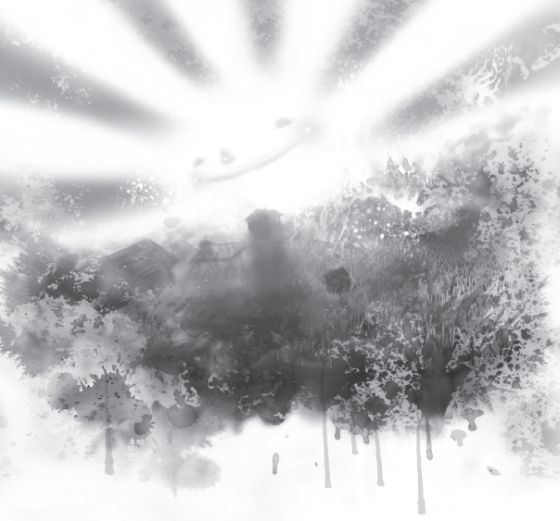
Farther off, she heard the good-blood-love twang of the bond between mother and son,
the crying of a foot,
the munching of flesh,
clumsy, lonely footsteps,
the ebb and flow of mucous in a dog's nose,
bones cracking, minds cracking,
the earth crackingâ
but winding through it all, like a single golden thread,
a single-note life-song,
a songbird atop the fairy's tree,
singing.
Thenâ
someone shouted, “Vermin!”
A smaller, shriller voice screamed, “Lummox!”
“Pip-squeak!”
“Meathead!”
A lumbering foot pressed sprout pulp deeper into the ground, and another foot descended upon Tulip's head, her bold and beautiful head. Because Daisy had listened, Daisy ducked, to live to see a better dayâ
A better, more beautiful day.
Puddle One was hers alone now, to shareâif she wished.
Just before Fat and Bones met in the field, face-to-face for the first time, a tired, old hound dog returned to the farm. He was harmless, except for his cold. I've heard it said that a butterfly can flap its fragile wings and cause a tsunami thousands of miles away. Might a dog's innocent sneeze have a similar impact? A dog's sneeze might, say, blow across a field of wheat and send an aging fairy hurtling into the face of a dead farmer's son just when the two are getting to know each other better.
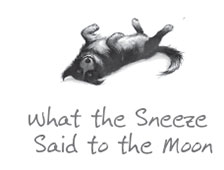
Dog Alfred sniffed.
Darn this cold, he thought.
He sneezed.
He had been sniffing and sneezing for days now, which was the reason his visit to his mom had ended early.
“Get home,” she had told him. “And get well.”
“Ma,” he said, “I came all this way. I can't go home now.”
“You live next door,” she said.
Dog Alfred blew his nose, expertly aiming the thread of snot into a stack of hay in the corner of the barn.
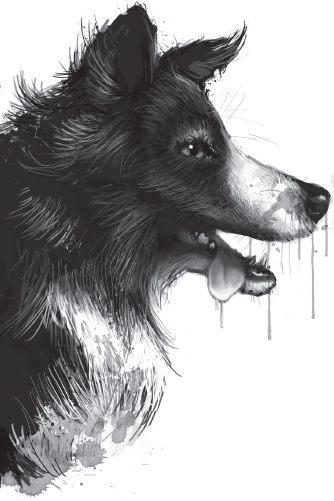
His mom gave him a disapproving look.
“Days are growing shorter, nights are growing colder. You'd best get well before winter sets in.”
The thought of lying in front of a fire was too tempting to ignore. Dog Alfred nuzzled his mom and left.
And came home not to a warm hearth but to a cold grave.
He sniffed the earth and the body it held. He could still identify the man's tangy odor.
Bald had not been a good man, nor had he been a bad man. He had just been a man. All dogs with discerning sniffers know that good men smell musky when they die, bad men smell rotten, and just so-so men smell tangy. Tangy like a lemon that's been chewed on and sucked on and batted around in the dirt for a while.
Dog Alfred hung his head. He didn't feel sad. He felt lost. Bald had not given Dog Alfred love, but he had given the dog direction.
“Follow me, boy,” he'd say when they went hunting. Dog Alfred would dutifully follow.
“Fetch.”
Dog Alfred would fetch.
“Sit.”
Dog Alfred would sit.
“Stay.”
Dog Alfred would not move, save for raising his heavy eyelids to see Bald better against the glare of the sun.
Dog Alfred liked being told what to do. It saved him the trouble of deciding what to do on his own. He wasn't like the cat, who never seemed idle. Even while sleeping, the cat appeared to be thinking something or waiting for someone or plotting something against someone.
Where was that cat, anyway? The cat usually trailed Mrs. Bald around as if she were made of sardines.
Where was Mrs. Bald?
And where was that no-good Bones?
When Bones dies, thought Dog Alfred, he'll smell like rotten eggs stirred in spoilt milk with a dash of pee. Really yellow pee. Eggs and milk and really yellow pee, that's what he'll smell like.
Dog Alfred yawned, his eyelids twitching up and down. He wandered around the farm.
“What's going on?” he said to a big, black pig.
“Not much,” said the pig, lying on her side on the ground.
Dog Alfred wished to appear purposeful in front of the pig, this big pig whose eyes shone as if she held a secret. “Nice day for a walk,” he said.
“I wouldn't know,” said the pig.
Dog Alfred observed that the pig did not have any feet. “Oh, I'm sorry,” he said.
The pig smiled. “Don't be,” she said.
It must be the worst tragedy in the world to lose one's feet, Dog Alfred thought. “Don't you miss them?” he said, pointing at her stumps with his nose.
“It was worth it,” she said.
“Oh,” said Dog Alfred. He didn't understand. And his discomfort increased the longer he stared at her stumps. “Well, I'd best get going.”
“Enjoy your walk.” The pig wiggled her ears.
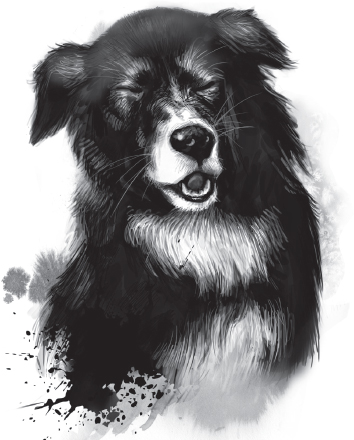
“Thanks. You enjoy, uh, sitting there.”
“Will do.”
Dog Alfred shuffled along. He sniffed the earth. He sniffed the air. He sniffed everything he passed. When he had sniffed himself tired, he wandered to the side of the house.
He found Mrs. Bald hanging from the clothesline. He wondered why she was not inside cooking. She was always cooking. Maybe she'd decided to try something new because Bald was underground and everything felt topsy-turvy for her. Dog Alfred knew that if his mother died, he'd probably want to hang from a clothesline too.
The cat sat by Mrs. Bald and gave Dog Alfred a dirty look.
Dog Alfred moved on. His cold had begun to make his head hurt. A sudden thirst overtook him.
He sneezed.
His sneeze, a blithe little thing, blew across the field, where someone shouted.
Dog Alfred lifted his head to see what was happening, but the wheat stood too high.
He gave up and wandered back to Bald's grave and lay down. Maybe when Mrs. Bald came down from the clothesline, she would tell him what to do.
He sniffed. Even through a stuffed nose, he thought he smelled garbage. Or was it eggs?
Meanwhile, Dog Alfred's sneeze flew around the farm, then into the sky.
The man in the moon was just beginning to yellow up for the night. The sneeze snuggled against the man and whispered in his ear. The man in the moon frowned, inspecting the trodden field. Fixing this would take time.
Below, on the farm, in front of the clothesline, Bones knelt before his mother, his hands outstretched, his head bowed. Fat pumped his arms as though he had conquered the world. And the cat turned toward Fat.
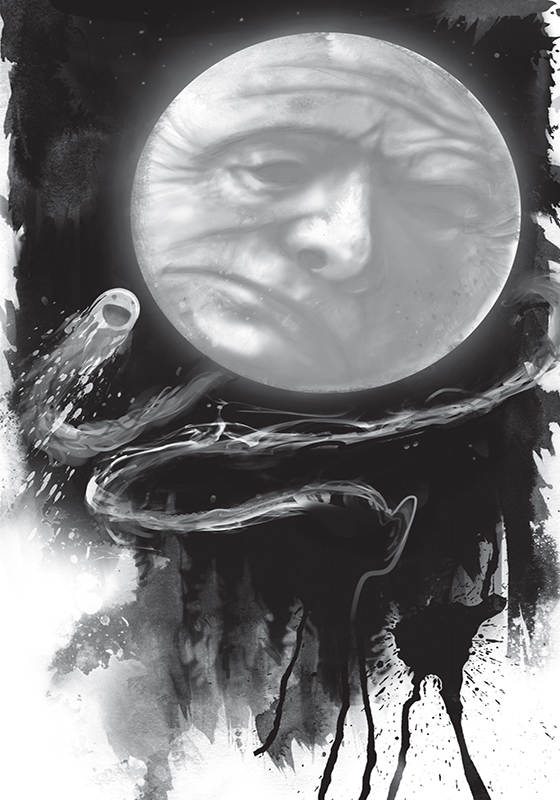
I've always loved the texture of fairies. They crunch so wonderfully. Better than mice. And their wings, so airy and light, taste a bit like cotton candy. You may not have known that cats like cotton candy, but we do. We like it almost as much as we like fairies.
After swallowing Fat, I smiled innocently at Mrs. Bald and backed up against Bones's face. I stuffed what was left of my tail up his nose and closed his mouth with my paws. He was too beat down at that point to put up much of a fuss. He jerked once or twice, then lay still.
All was quiet.
With the sounds of war gone, Mrs. Bald's tear ducts dammed up. Little by little, water filled her skin, and it didn't take more than two hours for her to be just as she had been. I licked her hands. She always liked it when I did that.
The first thing Mrs. Bald did when she unpinned herself from the clotheslines was to fill my shiny red food dish with a fresh batch of pig foot stew.